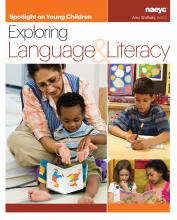Excerpt from Spotlight on Young Children: Exploring Language and Literacy

Sagacious, Sophisticated, and Sedulous: The Importance of Discussing 50-Cent Words With Preschoolers
by Molly F. Collins
A teacher once told me, “Don’t use a 50-cent word when a 5-cent word will do."
While current expression of such sentiments might differ, we commonly follow this practice in many early childhood classrooms. Adults often use simple words instead of complex words when talking to young children. Reasons vary from teachers’ beliefs that young children cannot understand sophisticated vocabulary because they are too young or have limited language skills to teachers’ unfamiliarity with complex words or with strategies for supporting vocabulary. As a consequence, sophisticated vocabulary learning is thwarted and opportunities to nurture children’s curiosity about words go unrealized. In this article, I show how to fortify the vocabulary knowledge of soon-to-be readers with sophisticated vocabulary—words that are high level, communicate subtleties in detail, and are less common in everyday parlance (sometimes called rare words).
Early Language Foundations for Reading Development
Research on the early foundations of reading distinguishes two categories of skills—one related to word recognition and the other related to comprehension. Print knowledge, beginning writing skills, and phonological awareness have been grouped together as word recognition skills because they help children decode text. These code-related skills account for most of a child’s success in word recognition, the major task of beginning reading. Vocabulary, syntactic and discourse skills, and background knowledge have been grouped together as oral language or comprehension skills (Storch & Whitehurst 2002; Sénéchal, Ouellette, & Rodney 2006). Developed in preschool, oral language skills predict later reading comprehension beyond the contribution made by word recognition skills in the early grades (NICHD Early Child Care Research Network 2005).
Vocabulary is highly sensitive to early adult input and critical to preventing later reading comprehension difficulties (Dickinson et al. 2003). Also, vocabulary is causally related to comprehension—that is, it helps reading comprehension (Dickinson et al. 2003)—and it is highly correlated with the rate of learning new words (Rowe, Raudenbush, & Goldin-Meadow 2012). Thus, a meager beginning vocabulary slows the rate of vocabulary learning, which compromises reading comprehension.
Two widely examined contexts for early language development are conversations and storybook reading. Pan and colleagues (2005) found that exposure to unfamiliar words in mothers’ talk with children is related to children’s vocabulary growth. Research on teachers’ talk at mealtimes shows a positive relationship between conversations and preschoolers’ vocabulary development (Cote 2001). Robust word learning has been found extensively in story reading contexts (De Temple & Snow 2003).
While numerous studies have examined vocabulary acquisition, most focus on common words—that is, high-frequency vocabulary. A few studies examine children’s acquisition of sophisticated, or low-frequency, vocabulary. Dickinson and Porche (2011) find that preschool teachers’ use of complex vocabulary during play contributes to children’s reading comprehension in fourth grade. Research shows that among preschoolers in families with low incomes, there is a positive relationship between the amount of exposure to sophisticated words and supportive explanations during conversations with parents and children’s later vocabulary (Weizman & Snow 2001). In storybook reading contexts, Beck and McKeown (2007) find that kindergartners and first-graders from families with low incomes learn sophisticated words from robust instruction during read-alouds. Preschoolers who hear rich explanations of sophisticated words learn significantly more words than children who do not (Collins 2010). These studies provide compelling evidence for the benefits of teaching sophisticated vocabulary to children in preschool through first grade, and they describe useful strategies and contexts for supporting this development.
From Spotlight on Young Children: Exploring Language and Literacy, edited by A. Shillady. Copyright © 2014 by the National Association for the Education of Young Children.
